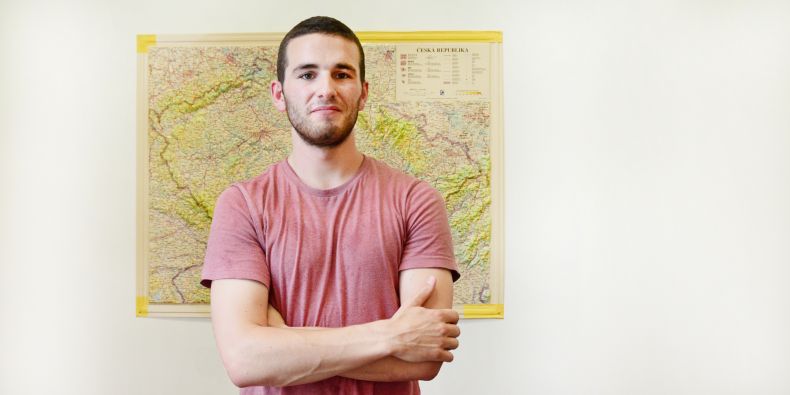There are many different reasons why foreigners decide to start learning Czech. Some have family in the Czech Republic, some come here to work, while others simply fall in love with the Czech culture. However, none of these reasons apply to Harry Patterson, a British participant in this year's Summer School of Slavonic Studies at the MU Faculty of Arts. Harry chose to study Czech as a foreign language simply because it was an interesting challenge.
“Back home, I studied French at the University of Sheffield and decided to take Czech and Russian as my other foreign languages. They are similar to each other, there was the option to study them abroad and I also heard that Czech is a difficult language with a lot of exceptions, so I wanted to give it a try," says Harry in excellent Czech.
He has been learning Czech for four years and the time has certainly not been wasted – Harry has a talent for languages and was able to achieve a very high level of proficiency. "Studying two Slavic languages at once was a big help at the start as many things are the same. On the other hand, the grammar of both is quite difficult, and those seven cases in Czech are enough to give you the horrors!" he laughs.
As soon as he picked his new languages, he started looking for more information about the Czech Republic. He describes how he studied the map of the Czech Republic, searched for Czech music and listened to Czech rap artists. During his second year of studies, he was awarded a scholarship to attend the summer school in České Budějovice, which was followed by a semester in Brno. And because he completely fell in love with the city during his Erasmus+ stay, he is back this year to attend the summer school here.
"It was great. I knew a couple of people from Brno back from Sheffield, so I even had housemates to stay with when I arrived. I really like the city. During my second year, I wrote an essay on functionalism, which has a significant presence in Brno. Even my father, who is an architect, would like it here," says Harry. Besides all these advantages of Brno, he also has stories to tell about what he has been up to with his Erasmus friends and is a fan of the local skatepark.
As the Czech Republic is a small place and there are not many reasons for foreigners to try and learn the difficult local Slavic language, he has been able to experience the positive reactions that a foreigner gets from Czechs when they hear him speak their language.
"It seems like Czechs are really into travelling. I always meet them wherever I go. And they are always very friendly. You are good people," says the young Briton, who does not see any big differences between Czechs and his compatriots. He does admit, though, that Czechs are a bit difficult to get close to.
But he now has another nation's mentality to study as well. When the summer school in Brno is over, he will be off to Moscow, where he recently signed a three-year contract to teach at a local British school. Another country, another challenge, as he says: "Languages are a big hobby for me. Am I afraid of a new life in Russia? Not at all. I love my job!
